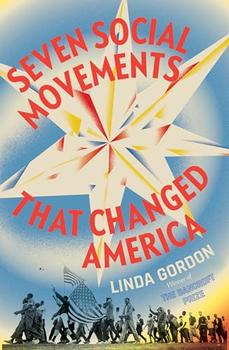
by Linda Gordon
A brilliantly conceived and provocative work from an award-winning historian that examines how seven twentieth-century social movements transformed America.
How do social movements arise, wield power, and bring about meaningful change? Renowned scholar Linda Gordon investigates these and other salient questions in this "visionary, cautionary, timely, and utterly necessary book" (Nicole Eustace), narrating how some of America's most influential twentieth-century social movements transformed the nation.
Beginning with the turn-of-the century settlement house movement, the book compares Chicago's celebrated Hull-House, begun by privileged women, to a much less well known African American project, Cleveland's Phillis Wheatley House, begun by a former sharecropper. Expanding her highly praised book The Second Coming of the KKK, the second chapter shows how a northern Klan became a mass movement in the 1920s. Contrary to what many Klan opponents thought, this KKK was a middle-class organization, its members primarily urban and well educated. In the 1930s, the KKK gave birth to dozens of American fascist groups―small but extremely violent.?Profiles of two other 1930s movements follow: the Townsend campaign for old-age insurance, named for its charismatic leader, Dr. Francis Townsend. It created the public pressure that brought us Social Security, which was considered radical at the time, as was the movement to bring about federal unemployment aid for millions.
Proceeding to the 1955–1956 Montgomery bus boycott―which jump-started the career of Martin Luther King, Jr.―the narrative shows how the city's entire Black population refused to ride segregated buses; initiated by Black women, their years-long, hard-fought victory inspired the civil rights movement. Gordon then examines the 1970s farmworkers struggle, led by Cesar Chavez and made possible by the work of tens of thousands of the primarily Mexican American farmworkers. Together they built the United Farm Workers Union, winning better wages and working conditions for some of the country's poorest workers. The book concludes with the dramatic stories of two Boston socialist feminist groups, Bread and Roses and the Combahee River Collective, which influenced the whole women's liberation movement.
Throughout the work, Gordon concentrates not on ideologies but on how millions of grassroots activists strategized and changed the United States. Separately and together, these seven narratives bring to life the creativity and hard work of social movements, and in doing so reveal how they have been central to American history, in stories that reverberate with today's political activism.
"Besides profiling movement leaders, Gordon pays close attention to what she calls their 'followership,' individuals not usually identified as leaders but who developed and promoted strategies and tactics that enabled movements to succeed...Whether they affect lasting change, social movements generate camaraderie, solidarity, and the shared conviction that 'risks are worth taking.' A timely, stirring history." ―Kirkus Reviews (starred review)
"Gordon examines seven important social movements of the twentieth century, how they were organized on a grassroots level, and how they have influenced American society...Considering the impact these movements continue to have even in the present day, modern readers will not only derive historical value from these stories but also insights applicable to today's social upheavals." ―Booklist
"Distinguished historian Linda Gordon explores where social movements come from, how they operate, and how they have introduced lasting change in American life. She shows us how over more than a century, on both political right and left, citizens have taken matters into their own hands in ways that have been foundational to the history and practice of American democracy. It is a book that at once explains and inspires." ―Drew Gilpin Faust, author of This Republic of Suffering, Pulitzer Prize finalist
"With characteristic élan, Linda Gordon's beautifully realized and quite riveting analytical history probes the origins, qualities, and effects of social movements that mobilized millions. She reveals how these mass efforts overcame problems of collective action to alter the landscape of American life." ―Ira Katznelson, author of Fear Itself, winner of the Bancroft Prize
This information about Seven Social Movements That Changed America was first featured
in "The BookBrowse Review" - BookBrowse's membership magazine, and in our weekly "Publishing This Week" newsletter. Publication information is for the USA, and (unless stated otherwise) represents the first print edition. The reviews are necessarily limited to those that were available to us ahead of publication. If you are the publisher or author and feel that they do not properly reflect the range of media opinion now available, send us a message with the mainstream reviews that you would like to see added.
Any "Author Information" displayed below reflects the author's biography at the time this particular book was published.
Winner of two Bancroft Prizes for best book in American history, Linda Gordon is the author of The Second Coming of the KKK and a biography of photographer Dorothea Lange. She lives in New York and Madison, Wisconsin.
In youth we run into difficulties. In old age difficulties run into us
Click Here to find out who said this, as well as discovering other famous literary quotes!
Your guide toexceptional books
BookBrowse seeks out and recommends the best in contemporary fiction and nonfiction—books that not only engage and entertain but also deepen our understanding of ourselves and the world around us.